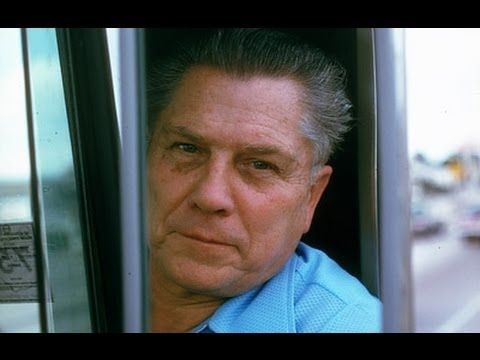With Labor Day on the horizon, I thought it would be a good time to revisit the ‘urban legends’ which surround the July 30, 1975 disappearance of Jimmy Hoffa as the byproduct of possible influence operations. While there is generally strong agreement that the mob was responsible for Hoffa’s vanishing, there are also many conspiracy theories which have linked Hoffa posthumously to both the John F. Kennedy (JFK) and Robert F. Kennedy (RFK) assassinations.
Taking the knowledge that certain aspects of conspiracy which surround the JFK assassination narrative as presented in films like Oliver Stone’s JFK are the result of Soviet disinformation operations, here we will look at the apparent origins of the Hoffa narratives and how they might follow similar contours. In the end, the most popular conceptions of Hoffa as we know him today seem linked to Trotskyites and other radical writers. Notably, the narratives have most strongly emerged from a network of writers who are very close to Hustler magazine publisher Larry Flynt.
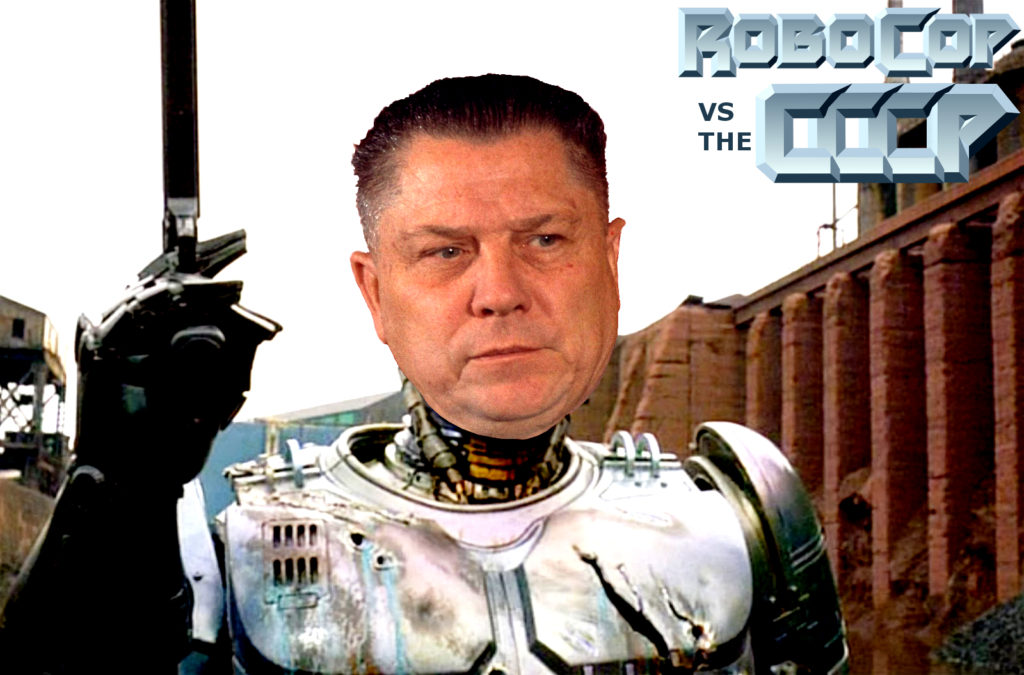
1.) Farrell Dobbs
According to the Trotskyite historian Bryan Palmer, Hoffa’s potential conflicts and contrasts with Trotskyists seem to begin during the mid 1930’s – early 1940’s when the Trotskyite Farrell Dobbs was a major leader in the Teamsters Union and had attempted to align the organization with the Socialist Workers Party (SWP) before and after the Minneapolis Trucker’s Strike of 1934. Trotsky was apparently directly involved in the attempts to influence the struggle; writing of the Minneapolis situation in 1940 – “The danger—a terrible danger—is adaptation to the pro-Rooseveltian trade unionists”.
Dobbs had trained Hoffa, but Hoffa then aligned with pro Franklin Delano Roosevelt (FDR) labor elements and Palmer implies Trotsky’s 1940 warning had been “all too correct” as a ‘conspiracy involving the FBI, the police, the national Teamsters leadership and thugs employed by the up-and-coming bureaucrat Jimmy Hoffa’ crushed the Trotskyite labor movement (Dobbs had officially left the Teamsters to become National Labor Secretary of the Socialist Workers Party (SWP) in 1939). Shortly afterwards in 1941, Dobbs was convicted of trying to overthrow the US Government in charges brought under the Smith Act and he was jailed from 1944-1945.
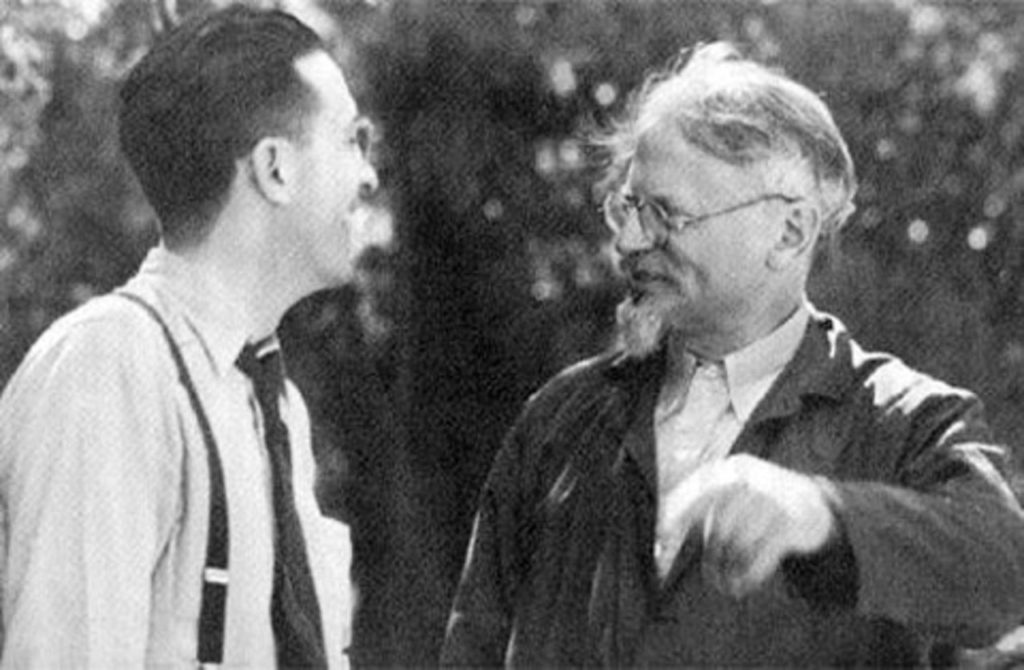
While Hoffa’s later reflections on the 1940-1941 labor movement praised the organizing skills of Dobbs, Dobbs did apparently reinforce the idea of a connection between Hoffa and the establishment that contrasted him with the Trotskyites :
“Now it is true that Hoffa was among the IBT (International Brotherhood of Teamsters) goon squads that Tobin sent into Minneapolis against Local 544 in 1941. That’s actually true. But Hoffa says, he says that he whipped us. Now, it’s a little more complicated than that. Hoffa got just a little help, if he thinks he whipped us. For instance, he was helped by the Minneapolis Police Department, the courts of the city, the county, and the state… the Mayor, the Governor and an anti-labor Law that had been rigged and put through by the Republican Governor of the State—and by the Federal Bureau of Investigation, the United States Department of Justice and Franklin Delano Roosevelt, who then happened to be President of the United States…” – Farrell Dobbs
There seems to be historical agreement that Hoffa did factually interrupt Trotskyite attempts to take over the Teamsters Union through an alignment with pro-establishment forces; and that perhaps as early as the 1940s, Trotskyites were spreading messages about how Hoffa was involved with “goon squads” and ‘thugs’, as well as working directly with the police and FBI. Dobbs was openly a Trotskyist and Communist who was objectively jailed for activities which advocated overthrow of the government. He ran four times for US President as candidate of the SWP (1948, 1952, 1956, and 1960).
2.) Paul Jacobs
The next prominent figure related to the propagation of the Hoffa conspiracies as we know them today seems to be the writer Paul Jacobs. Jacobs’ 1978 Washington Post obituary described him as a “Trotskyist” (1930s), “radical” (as a writer on labor movements), and a “Socialist” (at the time of his death); closely affiliated with both the leadership of the Black Panthers and The Fund for the Republic. He was one of the founders of Mother Jones.
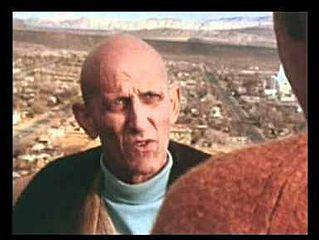
Ironically, when he was discussed in front of the House Committee on Un-American Activities (HUAC) in 1956, within the context of the argument that The Fund for the Republic was actually a communist front which sought to undermine the blacklisting of Communists, Jacobs was described as a noted “anti-Communist”.
[HUAC committee member Richard Arens] In what capacity was Paul Jacobs employed?
[Fund for the Republic executive staff represenatative John Cogley] Paul Jacobs was recommended to me as a knowledgeable anti-Communist by a movie producer; that is, a movie executive. Therefore, I assigned Mr. Jacobs to the Hollywood study – he lives in Los Angeles – to concentrate especially on communism in Hollywood and the labor situation in Hollywood.
[Arens] Did you know that Paul Jacobs had been a member of the Young Communist League?
[Cogley] I knew not at the time I hired him what his affiliations were…
Jacobs wrote for The Reporter magazine which was funded by The Fund for the Republic, and would later go on to write for the notably KGB-compromised Ramparts.
Jacobs was notable not only for his anti-CIA reporting for Ramparts and travels to the USSR, nor just for his pioneering work on atomic fallout (he claimed himself to have been stricken with cancer due to his exposure to nuclear test sites), but for his apparently pioneering and numerous attacks on Jimmy Hoffa, as chronicled in his writing for The Reporter in stories like ‘The World of Jimmy Hoffa’. Jacobs seems to portray Hoffa somewhat as a thuggish corporatist aligned with the establishment. Jacobs would also write critically of CIA-penetration of labor unions for Ramparts. (These Jacobs screeds are preserved at the site UNZ.com which seems to belie its association with Russian disinformation as a historical media repository which promotes such notable Kremlin-aligned disinformers as Israel Shamir.)
Despite Cogley’s claim that he had been unaware of Jacobs’ past Communism when he was hired, it seems clear that the record was cleared up by the time of his obituary. It is also clear Jacobs’ narratives about the blacklist were closely tied to Hollywood and the film industry somehow.
The apparent discontent with how Hoffa had aligned the Teamsters Union to the political establishment, and denied such control to presumably socialism-aligned workers groups seems to have simmered somewhat until after the deaths of JFK (1963), RFK (1968), and presumably Hoffa himself in 1975.
3.) Dan Moldea (as inspired by Seymour Hersh)
However, in 1978 the idea of a Hoffa involvement in the Kennedy assassinations was first made salient in the Dan Moldea book, The Hoffa Wars (or at least Moldea claims to be the author of the first “non fiction” book on the topic, though a below quote shows figures like Donald Freed seem to have conceptualized it as early as 1977). Also relevant is Moldea’s later book about presumed Reagan connections to the mob: Dark Victory (1983).
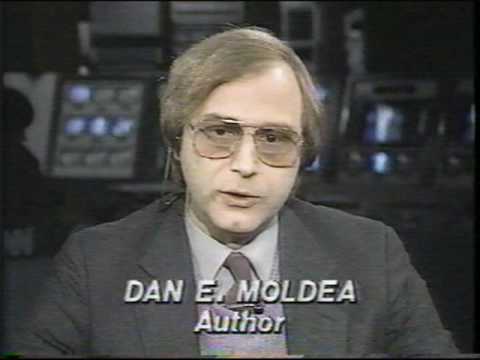
In the case of Hoffa, Moldea had taken content originally inspired by Seymour Hersh about figures like the Howard Hughes and CIA-connected Robert Maheu; as well as mob attorney Sidney Korshak and then wrought the characterizations into a narrative about Hoffa connections to the Kennedy assassinations.
Hughes is notable in the context of Hollywood anti-Communism and for being the target of Orson Welles’ (probable communist) conspiracy theories, and Korshak was a well-known mobster who had extorted money from Hollywood studios in the 1940s and was seen as an important link between organized crime and corporate interests. Korshak had allegedly used sexually compromising materials to affect political races.
(Note that connections regarding Maheu and Hoffa as drummed up by Hersh and Moldea are still used to attack the CIA at modern disinformative sites like GlobalResearch.)
As New York Review of Books opined in its 1979 review of The Hoffa Wars, perhaps disputing Moldea’s own “non-fiction” designation for his own work:
“[Moldea’s] shovel throws up the ore and the slag in one indiscriminate mass. On the one hand we have page after page of conscientious, if recondite, detail about the grievances of steelhaulers, the tribulations and treasons of innumerable uprisings against the union’s bravoes, and the beatings and the bombings in the quarrel over Detroit Local 299 between Teamster professionals who had deserted James R. Hoffa and those still loyal to him. On the other hand we have any number of fantasies about the malignant authority exercised by Hoffa over our national history, an authority in a coalition of the Teamsters Union and organized crime. This is the coalition that may or may not have murdered President Kennedy, that ran guns to overthrow Batista, and that then appointed hit men to assassinate Castro. It is all made vivid by irrelevancies…”
In this sense, Moldea’s book seems to pay scholarly attention to the struggles of union activists, but when it comes to suppositions about the actual matter of the conspiracies themselves, he relies on largely speculative approaches.
Around 1981, we see Moldea content starting to appear in apparently disinformative sources like Lyndon LaRouche’s ‘Executive Intelligence Review’ which puts the Hoffa conspiracies in the context of Ronald Reagan’s alignment with the mob via union activity. Two years later, Moldea would publish his Dark Victory book on the subject.
Around this time, Larry Flynt, publisher of Hustler magazine becomes an apparently significant figure in the promotion of quite similar theories about Reagan, the Kennedys, and Hoffa; via the publication of the short-lived The Rebel magazine from 1983.
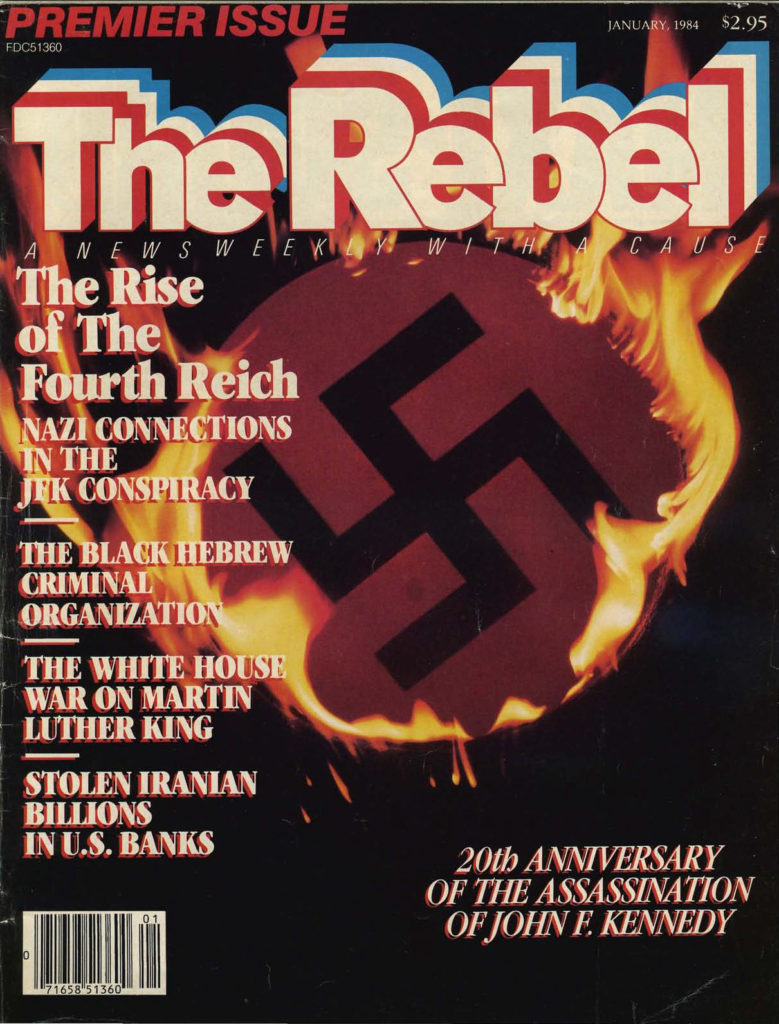
4.) Larry Flynt, Oliver Stone, and Donald Freed
Reviewing The Rebel from my philosophical standpoint of armchair ‘Kremlinology’, I noted that the magazine has an incredibly strong conspiratorial anti-fascist vibe, which equates the CIA with Nazi intelligence as the cover story. The Larry Flynt-written editorial which opens the first issue cites Flynt’s contemporaneous problems with raids by Federal law enforcement agents. Also significant to me was that one of the main writers for the publication was Donald Freed; a radical activist who was tied to the Black Panthers movement and had himself been raided by Federal agents for possessing explosives.
(It seems that Freed dabbled a bit in Hoffa conspiracy as well based on this 1977 ‘Liberation Magazine’ article: ‘Fidel on the Grassy Knoll’, also written with Jeff Cohen who wrote for The Rebel: “Similar death threats against JFK made by Jimmy Hoffa, mobster Carlos Marcello, and CIA contract agents like David Ferrie are not given such attention”.)
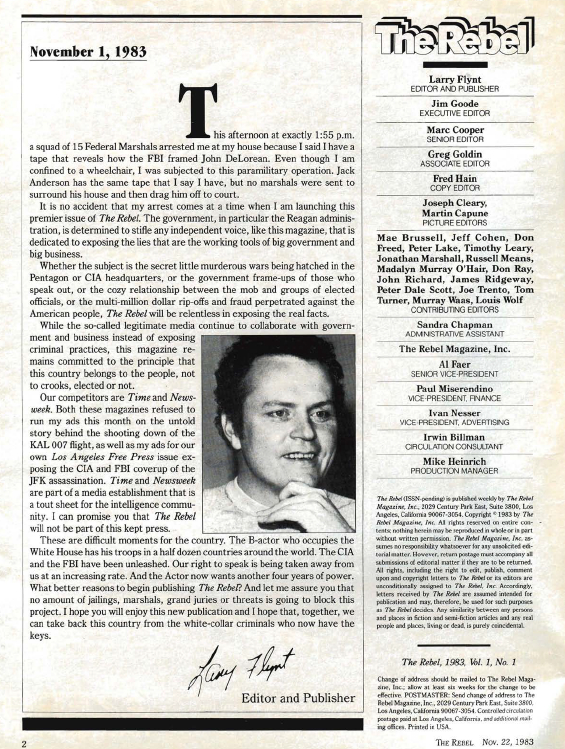
I knew about Freed already, having explored his prior collaboration with my favorite anti-fascist Russian influence agent “prime suspect”, Orson Welles. Welles and Freed worked together on the screenplay for ‘Sirhan Sirhan : RFK Must Die’, a nearly-produced, but unreleased film which argued that the CIA had had a role in the supposed brainwashing of Sirhan Sirhan, leading him to murder RFK. The script also equated Federal law enforcement with “Nazis” in the context of agitating African Americans about the Dr. Martin Luther King Jr. (MLK Jr.) assassination. (“These vicious honky pigs gonna pen us all up in concentration camps – they’re playing the Nazis but we ain’t gonna play the Jews!”)
Freed had previously collaborated with Welles’ contemporary, the blacklisted Hollywood screenwriter Dalton Trumbo on the film Executive Action (1973) which argued for a CIA role in the JFK assassination. Executive Action is seen as a spiritual predecessor of sorts to the modern interpretations of the JFK assassination, like Oliver Stones’ JFK (1991). It has been recently explored in the mainstream – if not accepted officially today – that Soviet disinformation had a role in shaping the false impression that there was a connection between the CIA and JFK assassination; and Stone’s film has been specifically critiqued in this regard. Not to mention Stone’s recent and widely-criticized one-sided interview with Vladimir Putin.
Interestingly Oliver Stone again provides an important reflective point, that links back to the theme of Larry Flynt in the context of Hollywood anti-fascism. In 1996, Stone produced the Milos Forman-directed The People vs. Larry Flynt; which portrayed Flynt as a complex, although sympathetic character who was a champion for free speech and the First Amendment. The Czech New Wave film director, Forman, who had taken on the project at Stone’s urging, had not advocated for the content of Flynt’s publications, so much as for the analogy of what preserving Flynt’s right to publish those boundary-pushing magazines meant in the context of resisting Nazi-like censorship.
Forman lost both of his parents in Nazi concentration camps, and he said of his inspiration regarding the Flynt film:
“I know what a devastating effect it has on life — not only on the artist but on everybody… There’s nothing more boring and cruel than a totalitarian system. And it always starts innocently with the government promising to clean the streets of pornography.” – Milos Forman
In 1992, the Jack Nicholson-starring, Danny DeVito-directed film Hoffa hit theaters. The project’s early champion, Executive Producer Joe Isgro — had actually intended for Oliver Stone to direct the film; and he was interviewed along with other notable directors before the film went to DeVito. The DeVito film was frequently compared to Stone’s JFK film which had come out just the year before as biased and one-sided. The film did not treat Jimmy Hoffa critically apparently so much as uncritically, which angered many liberals well-acquainted with stories of Hoffa’s strong-arm labor tactics. The film left the audience with the conclusion (similarly to Stone’s JFK), that the Mafia was definitely connected to the Hoffa disappearance.
However, much like NY Review of Books’ critiques of Dan Moldea’s ‘Hoffa Wars’, Hoffa was critiqued as “a biographical film based somewhat on fact, but also based in large part on the imaginations of writer David Mamet and director Danny DeVito” and that “the most interesting part of this film is the explanation it presents for Hoffa’s disappearance. It is creative and amusing, even if it is not at all factual”.
5.) Dan Moldea and Larry Flynt again
Since 1998, the self-described ‘Guerilla Writer’ Dan Moldea has been closely associated with Larry Flynt, operating as somewhat of a muckraker and political hitman of right wing figures. While Flynt has defended both Hillary and Bill Clinton from conservative attacks; Moldea’s collaboration with Flynt has classically relied on a sexual ‘kompromat’ style of reporting which was used to attack prominent Republicans like Rep. Bob Livingston – LA (1998), Rep. Bob Barr – GA (1999), and Sen. David Vitter – LA (2007). This business model has very strong similarities to the portrayals of sexual compromise of politicians by Korshak as developed by Moldea in his books. (The pro-Dugin neo-Nazi agitator David Duke of Louisiana notably capitalized on the 1998 opening created by Livingston’s scandal, running for the open seat; and some questioned if he tried to play a spoiler.)
Today of course, Larry Flynt is funding a massive similar operation to find incriminating material on Donald Trump which would lead to impeachment; and David Duke has thrown his unwelcome support in the ring for Trump on more than one occasion. (Much like Roseanne Barr and her presumably Russian-motivated QAnon-branded ‘endorsements’ of Trump.)
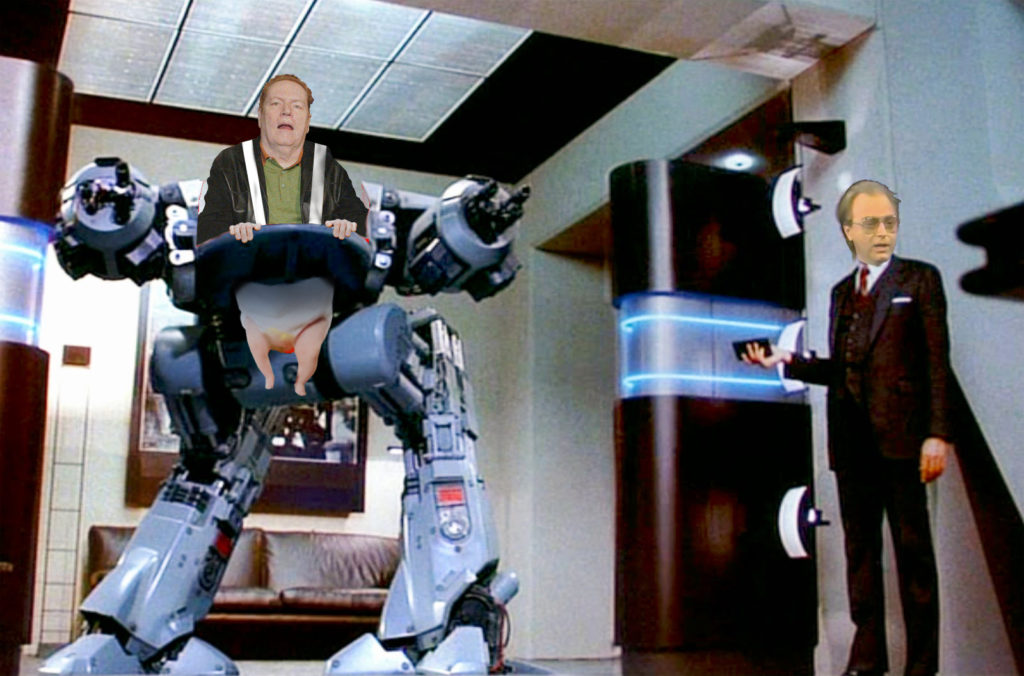
Who wrote this crap anyway?
Bringing this to a close, what this brief expose shows is that there is a narrative core of anti-Hoffa conspiracies which seem connected to the themes in anti-CIA and anti-mob JFK conspiracies which are widely accepted today to have been laid down through Russian disinformation channels. A lot of it links to the HUAC era. Maybe John Wayne was right about the dangers writers can cause.
The linkages between the Hoffa conspiracies and Kennedy assassinations seem drawn originally from the narratives of Trotskyites like Farrell Dobbs and Paul Jacobs.
The modern popular characterization of a connection between the Hoffa murder, CIA, and the mob seems in-part drawn from the narratives of folks like the once-described “little commie” Seymour Hersh and the fantastic portrayals of Dan Moldea which received a strong critique in credible 1979 reviews. These portrayals of a mob connection were reinforced in films like 1992’s Hoffa, which were similarly critiqued for their bias and imaginary renditions of what may have happened.
While it is clear Hoffa had conflicts with the Kennedys (RFK did put him in jail afterall), Richard Nixon had in fact pardoned him and commuted his sentence. Hoffa had attempted to work closely with Henry Kissinger. As his critics like Jacobs point out, he seemed to have been pro-corporation, at the same time he was pro-union.
There is no doubt that there were strong-arm and mafia tactics involved with the Teamsters; but there also doesn’t seem to be a question that Hoffa was ingrained with at least the right wing political establishment. It provides a plausible context as to why he would have been an enemy to radical leftists and Trotskyites. (He even had mutually favorable relations with MLK Jr., who referred to him as a “dedicated friend“. MLK Jr.’s death may also have been capitalized on by Russian intelligence with conspiracies as suggested by the above quote from the Donald Freed and Orson Welles script for ‘Sirhan Sirhan : RFK Must Die’.)
Today, we see a continuation in this theme of conspiratorial attacks on right wing politics via the work of Dan Moldea in conjunction with Larry Flynt. In addition to Moldea, Flynt has employed people like Donald Freed who made apparently radical anti-American disinformation their principal profession and worked with other blacklisted figures and suspected Russian influence agents. One must ask at least a basic question if Larry Flynt is supporting ‘anti-fascist’ propaganda ‘active measures’ set by Russia. Perhaps even the involvement of David Duke may be a factor from a left/right conspiracism perspective. Flynt would be seeming today to contribute mightily to the political agitation around the Trump:Russia situation. (Duke, to be honest is just the next most trashy person I could think of.)
Flynt’s publications and activities themselves would seem to be ‘political bombs’ that aid anti-fascist political narratives which push the borders of free speech. Flynt has been set up to scream “fascist!” — should he be censored. In a sense this is like the debate over Alex Jones online today; should you be able to ‘yell fire in this crowded theater‘ of the public internet for a foreign sponsor?
Where does social justice end and where does criminal public mischief begin? Where does art end and where does vandalism begin? It seems to be near the same place. One man’s revolutionary is another’s terrorist. Anyway, I prefer the radicalism domestic, and not Russian-inspired, please.
A Better Conspiracy Theory – IT WAS THE COMMUNISTS, duh
So let me offer you this in closing instead. It was the communists who taught you what you probably know about Hoffa. It wasn’t the FBI responsible for Hoffa’s defeat of the Trotskyites; and there is no truth in stories about Hoffa taking advantage of CIA and Mafia connections to wipe out JFK and RFK. While a mobster might’ve killed Hoffa, the conspiracy to tarnish his memory in favor of communist labor seems the real crime today.
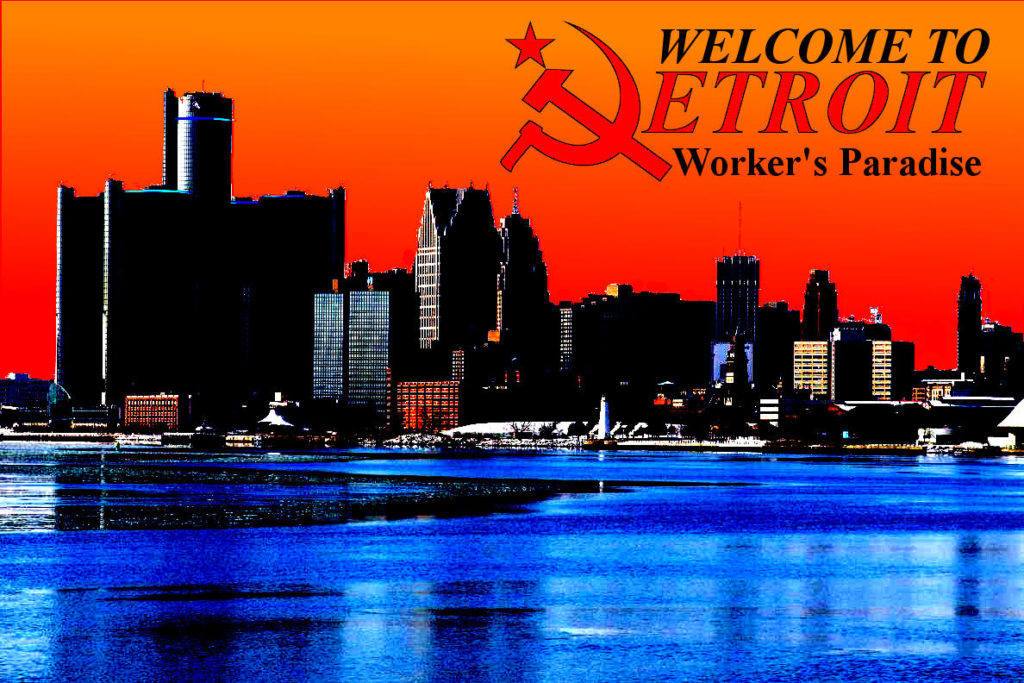
Just like 9/11 conspiracies which seemingly sought to undermine trust in the government, or the aforementioned JFK conspiracies, or potentially MLK Jr., and the rest of the ‘art war’ — this simply seems to be an apparent Marxist-Leninist kind of narrative set up to divide us as a country for Russia’s benefit. Pit the Democrats against the Republicans, the blacks against the whites, the Nazis against the anti-fascists. You get the idea.
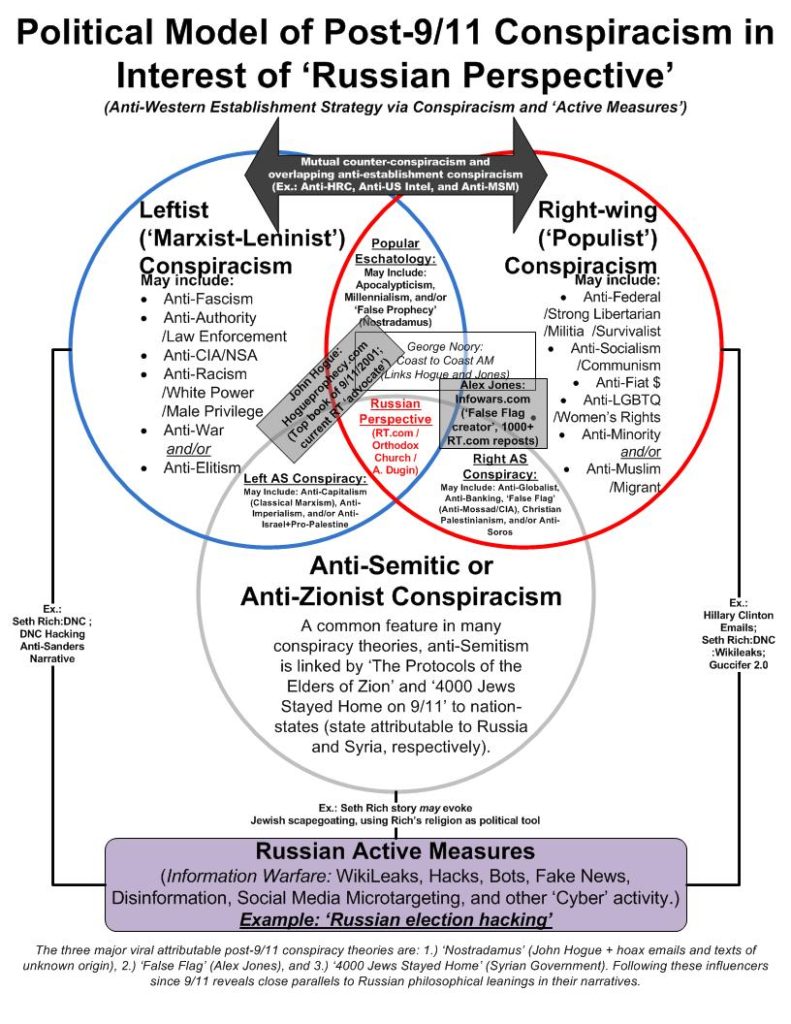
Did you know that the day before he disappeared, Hoffa lunched with the recently elected Mayor of Detroit Coleman Young? Young is understood today to have been a long-term CPUSA member. Young was a founder of the National Negro Labor Council which had been considered a communist front organization. As mayor, Young is also seen to have been sympathetic to Black Panthers members, much like Donald Freed and Paul Jacobs presumably as well. (Bonus: David Duke a pro-Black Panther?)
Well maybe Hoffa met with mobsters the day he died; but we know he met with a hardcore communist and labor radical the day before.
There seems to be a great irony in the end that Hollywood, and the Screen Writers Guild, which had so many conflicts with the authorities during the blacklist era – would get the responsibility for cementing the popular characterization of Jimmy Hoffa in the public narrative space (no pun intended). In the history of union struggle, it would seem elegant that many Hollywood communists might have found a kinship philosophically with the defeated midwestern Trotskyites.
Even Danny DeVito has expressed strong support for Bernie Sanders and Jeremy Corbyn recently; leading one to ask why he would make a fawning portrayal of Hoffa which would be widely criticized by liberals, despite a strong left of center political orientation? Why would Oliver Stone have been sought out to direct it originally? Is it just to hide the truth?
Maybe it is even similar to what Martin Scorsese did with Soviet-target Howard Hughes in The Aviator – and might even do to Hoffa next through an reinforcement of the mob-Hoffa angle to his upcoming film The Irishman (2019)? DeVito’s 1992 characterization wasn’t cruel or vile, but it seems to have principally reinforced the mob angle in its closing, visceral scene.
As the 1992 New York Times behind the scenes story of Hoffa revealed:
“Yet the man most responsible for assembling the screen epic about the charismatic and controversial leader of the International Brotherhood of Teamsters could hardly appear more his opposite. Edward R. Pressman, the producer, operates with delicate voice and meek mien. His office switchboard plays National Public Radio for callers on hold, and his chief associate bears the refined name of Caldecot… Only Mr. Pressman’s resume speaks emphatically. Over 23 years, he has produced 37 films, ranging from such large-budget blockbusters as Oliver Stone’s “Wall Street” and John Milius’s “Conan the Barbarian.” “
It seems highly possible that Hoffa’s legacy in the public consciousness has perhaps been defined by his most prominent opponents from the FDR era. Certainly Trotsky himself had made the pro-FDR unionists enemies. Trotskyite groups seem to have both supported and recruited from the Black Panthers. 1930’s-1940’s-era Hollywood Popular Front anti-fascism and communism seems pretty undeniable, and the earliest conspiracists about Hoffa (eg. Paul Jacobs) were tied to Hollywood as well as Trotskyite labor movements (which seem to have previously clashed with Hoffa during his rise to power). The post-Hoffa ‘Old Detroit’ of today seems well-known for Communist connections – whether that is the aforementioned Coleman Young, or John Conyers; and possibly Russian culture war too – see Madonna, Anthony Bourdain, Michael Moore, and Ted Nugent.
Why not Hoffa conspiracies? It seems to fit.
I don’t know who killed Jimmy Hoffa but I am pretty sure the only place he is buried is under disinformation. (Well, maybe Larry Flynt knows the truth.)
